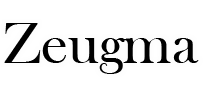Interview | Joyce Locke Carter
Zeugma's back with the fourth installment in our 2014 summer interview series, recorded at the Rhetoric Society of America conference in San Antonio, Texas. So far, we've heard from the University of Kentucky's Roxanne Mountford and Jeff Rice, as well as Syracuse University's Collin Brooke. Our final installment, which will arrive in early August, will feature Victor Vitanza of Clemson University's Rhetorics, Communication, and Information Design program. For interview #4, I sat down with Joyce Locke Carter.
You can stream the interview via the player below, or you can both stream and download it via this link (to download, just right-click the link and select "Save Link As").
Dr. Carter is an associate professor of English at Texas Tech University. She is the author of the book Market Matters; her work has also appeared in such journals as Technical Communication Quarterly and Computers and Composition. Dr. Carter's forthcoming book, Reading Arguments, is a suite of empirical studies using biometrics, usability, and field methods to find out how sophisticated readers engage with a document that asks them to make a decision. In it, she deals with a significant gap in rhetoric and composition scholarship: what audiences actually do when they read and respond to purposeful rhetorical acts. It's a fully digital book, filled with movies, images, and data, enabling the reader to dig deep on her own into these issues. She'll also be the program chair of the 2015 Conference on College Composition and Communication, or 4Cs, in Tampa, Florida.
In our conversation, we discuss Dr. Carter's responsibilities with 4Cs and why she believes it's especially important for rhetoric scholars to participate in the conference. If you're interested in more details on the workings of 4Cs, by the way, you can check out Dr. Carter's YouTube profile. We also discuss the broader relationship between rhetoric and writing studies, as well as rhetoric and English studies. Finally, Dr. Carter reflects on her founding role in the Digital Writing & Research Lab—or, as it was called at the time, the Computer Research Lab--and the work such labs continue to make possible.



